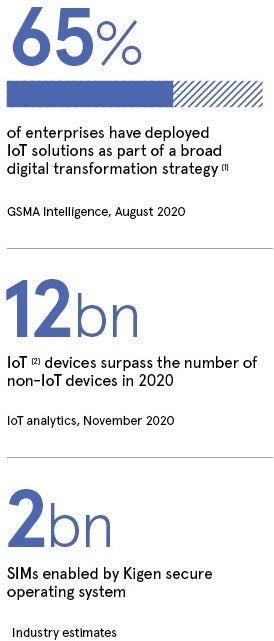
A confluence of events is accelerating the internet of things (IoT) and its potential to transform businesses, industries and wider society. While devices are getting cheaper, lower powered and more functional, coronavirus has forced organisations and consumers online much faster than anybody would have expected. The result is a clear opportunity to reach a trillion IoT devices globally in the next 15 years.
There is one overarching challenge standing in the way: trust. IoT promises a huge amount of value to businesses, industries and wider society, enabling monumental efficiencies, incredible new innovations and vital advancements in sustainability. But it is fundamental that IoT devices and the insights they generate can be really trusted.
A trillion may sound like a lot, but it starts with small devices generating tiny amounts of data. Scary stories in the media can quickly fuel wariness and, if people don’t trust those individual devices, the whole idea of big data is polluted and the opportunity is lost. To achieve trust on a large scale, it first needs to be baked into every single device.
“To get trust in a device, you have to build it in from the start,” says Vincent Korstanje, chief executive of Kigen, the security leader for cellular IoT. “A SIM is a vital technology for trust. A lot of the internet now runs on two-factor authentication and that runs on SIM. It gives a device an identity. To achieve trust, you then need to track where a device has been, who is loading software onto it and what its life cycle is. But it all starts with identity.”
People are familiar with SIMs as the small cards in their mobile phone, providing the connectivity to make calls and use data. If you change your mobile network provider, you take the SIM out and put a new one in. Yet while this may work well for mobile, it is hugely impractical to design holes for SIM cards into IoT devices, many of which need to withstand harsh environments and in the future could be as small as a grain of rice.
With this in mind, Kigen invested heavily in standardisation and pioneered integrated SIM (iSIM) technology, which provides the strongest foundation of identity for secure cellular IoT. When the IoT devices are tiny, remote and updated over the air, their lifespan is restricted by their battery life, putting high demand on efficiency. Kigen’s iSIM offers 70 per cent lower power consumption than a traditional SIM, making it suitable for all devices to be kinder to the planet too.
Some of the first products based on Kigen’s iSIM technology include an innovative smart label now used by pharmaceutical and life sciences firm Bayer to constantly monitor the status of its products and receive immediate insight into their global inventory. The smart label connects via public mobile networks and delivers a continuous service for three years, streamlining Bayer’s operations. The idea of a paper-thin connected device is striking, but Kigen’s iSIM technology is also going into connected consumer electronics, healthcare and even smart streetlights.
What stands out about Kigen is that as a provider of secure operating systems and enabler for advanced connectivity, it is driving this change through a standardised path for devicemakers. This derisks their path so they can focus on enabling new business models and increasing productivity.
To get trust in a device, you have to build it in from the start
“Every IoT device should have an iSIM in it,” says Korstanje. “It’s a fraction of a square millimetre on the silicon so the decision on if your product will ever use IoT becomes easy. iSIM is trusted as it implements certificate based security, and allows the devices to be updated over-the-air, which are both important for trust. iSIM enables security everywhere, while its small size makes it practical and affordable.”
By driving down the cost and power, and increasing the performance, iSIM technology unlocks all kinds of IoT use-cases to come to life, in growing areas such as smart cities, ebikes and escooters, and equally in more traditional industries such as healthcare, shipping and retail. IoT is becoming core to these industries, but they don’t manufacture in the same way as the smartphone or PC industries.
Kigen is looking to do for IoT what its parent company Arm did for smartphones. Arm pioneered a new way smartphones could be manufactured, with intellectual property for the silicon market, licensing a chip design so multiple vendors could collaborate, compete and bring different solutions to market.

The company is bringing a similar horizontal play to IoT, allowing multiple solutions to come to market much faster in areas such as healthcare and smart metering. By making iSIM the foundation of embedded trust for all IoT, traditional businesses can have the freedom to manufacture through their preferred suppliers and deliver services that matter most to their customers.
“We make IoT possible through the whole supply chain, enabling a highly flexible approach both for the business model and for how people can use our technology” says Korstanje. “We need to look at the supply chain as a multitude of players coming together and playing together, where everybody around the world can bring their best components to those devices and make a trillion devices a reality.”
Digital transformation not only has huge promise to make all our lives better but also is increasingly critical to our fabric of life as has been highlighted during the pandemic. However, with IoT, there is just so much more to come. That’s trillions of devices helping us live our lives in incredible ways. Though businesses need to innovate and collaborate so they can solve the trust conundrum for everyone involved.
Sources:
[1] Based on August 2020 data, per the GSMA Intelligence IoT revenue: state of the market 2020 report
[2] IoT Connections are defined as connected cars, smart home devices, connected industrial equipment, whereas non-IoT connections consider smartphones, laptops, and computers.
For more information please visit kigen.com or sign up to our upcoming webinar at kigen.com/solving-iot-trust
Promoted by Kigen

A confluence of events is accelerating the internet of things (IoT) and its potential to transform businesses, industries and wider society. While devices are getting cheaper, lower powered and more functional, coronavirus has forced organisations and consumers online much faster than anybody would have expected. The result is a clear opportunity to reach a trillion IoT devices globally in the next 15 years.
There is one overarching challenge standing in the way: trust. IoT promises a huge amount of value to businesses, industries and wider society, enabling monumental efficiencies, incredible new innovations and vital advancements in sustainability. But it is fundamental that IoT devices and the insights they generate can be really trusted.
A trillion may sound like a lot, but it starts with small devices generating tiny amounts of data. Scary stories in the media can quickly fuel wariness and, if people don’t trust those individual devices, the whole idea of big data is polluted and the opportunity is lost. To achieve trust on a large scale, it first needs to be baked into every single device.

